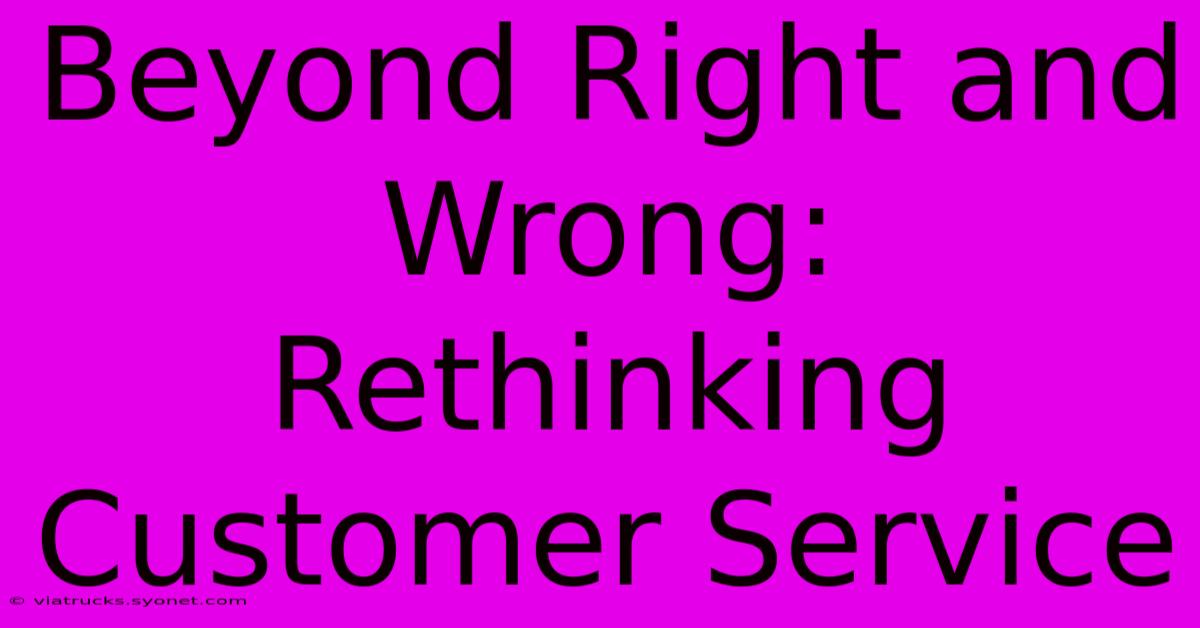Beyond Right And Wrong: Rethinking Customer Service

Table of Contents
Beyond Right and Wrong: Rethinking Customer Service
Customer service. Two words that can evoke a range of emotions, from blissful satisfaction to simmering rage. For businesses, it's not simply about adhering to a checklist of "right" and "wrong" actions; it's about forging genuine connections and building lasting relationships. This article delves beyond the superficial aspects of customer service, exploring innovative strategies for exceeding expectations and turning frustrated customers into loyal advocates.
Moving Beyond Transactional Interactions
Traditional customer service often focuses on resolving immediate issues—a transactional approach. While crucial, this approach misses a critical element: building rapport. Customers aren't just seeking solutions; they crave empathy, understanding, and a sense of being valued.
The Power of Empathy
Empathy is the cornerstone of exceptional customer service. It's about stepping into the customer's shoes, truly understanding their frustration, and responding with compassion. This goes beyond simply saying "I understand"; it involves actively listening, acknowledging their feelings, and demonstrating genuine concern.
Proactive Problem Solving
Rather than simply reacting to complaints, proactive customer service anticipates potential issues. This might involve regularly checking in with customers, offering personalized recommendations, or proactively addressing known product or service shortcomings. Proactive problem-solving demonstrates a commitment to customer satisfaction that goes above and beyond.
Personalization: The Key to Loyalty
Generic responses and automated messages rarely resonate with customers. Personalization is key to building strong relationships. This involves using customer data to tailor interactions, offering relevant recommendations, and remembering past interactions. A simple "remembering" a customer's previous purchase or preferences can make a world of difference.
Leveraging Data Ethically
The ethical use of customer data is paramount. Transparency is key; customers should understand how their data is being used and have the ability to control their preferences. Using data to personalize the customer experience should enhance, not detract from, their overall satisfaction.
Empowering Employees for Exceptional Service
Your employees are the face of your company. Empowering them to handle customer interactions effectively is vital. This means providing them with the necessary training, tools, and autonomy to resolve issues efficiently and empathetically.
Investing in Employee Training
Investing in comprehensive customer service training is not a cost; it's an investment in your company's success. Training should focus on developing strong communication skills, empathy, problem-solving abilities, and conflict resolution techniques.
Creating a Culture of Customer Focus
A company culture that prioritizes customer satisfaction is essential. This involves fostering open communication, valuing employee feedback, and rewarding employees who consistently go above and beyond. When employees feel valued, they are more likely to provide exceptional service.
Beyond the Complaint: Turning Negative Experiences into Positive Outcomes
Even with the best intentions, negative experiences can occur. However, how these experiences are handled can significantly impact customer loyalty.
The Art of the Apology
A sincere and heartfelt apology can go a long way in diffusing tense situations. It's not enough to simply say "sorry"; the apology should acknowledge the customer's feelings, take responsibility (where appropriate), and outline steps to rectify the situation.
Turning Complaints into Opportunities
View customer complaints not as setbacks, but as valuable feedback. Analyzing customer feedback can reveal areas for improvement in your products, services, and processes. This feedback loop is crucial for continuous improvement and building a stronger, more resilient business.
Conclusion: The Future of Customer Service
The future of customer service lies in prioritizing genuine human connection, proactive problem-solving, and personalized experiences. By moving beyond a simple "right and wrong" framework and embracing a customer-centric approach, businesses can cultivate lasting relationships and build a loyal customer base. It's not just about meeting expectations; it's about exceeding them, consistently and authentically.

Thank you for visiting our website wich cover about Beyond Right And Wrong: Rethinking Customer Service. We hope the information provided has been useful to you. Feel free to contact us if you have any questions or need further assistance. See you next time and dont miss to bookmark.
Featured Posts
-
Connecting With 216 Everything You Need To Know About This Location
Feb 11, 2025
-
Elecciones 2024 Descodificando El Voto De Georgia
Feb 11, 2025
-
Free Movies 123 Is Movies Fact Or Fiction
Feb 11, 2025
-
Unlocking The Sound What Genre Is Noah Kahan Anyway
Feb 11, 2025
-
Ufc Ownership Unveiled The Story You Havent Heard
Feb 11, 2025
